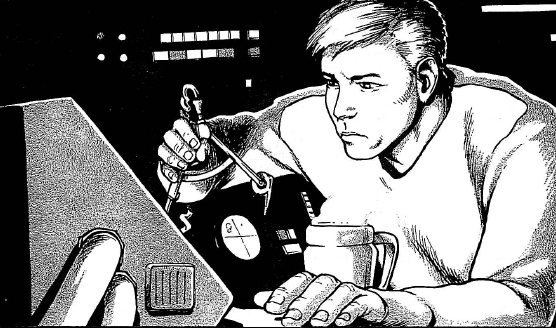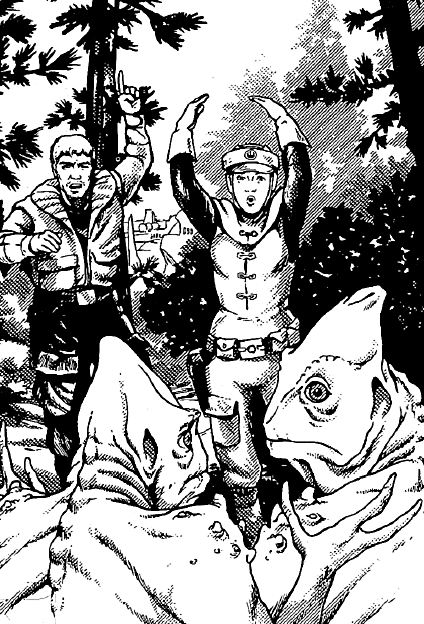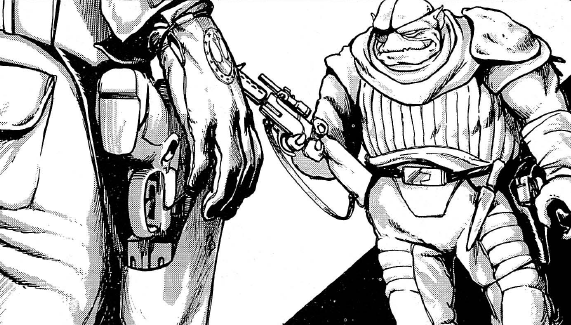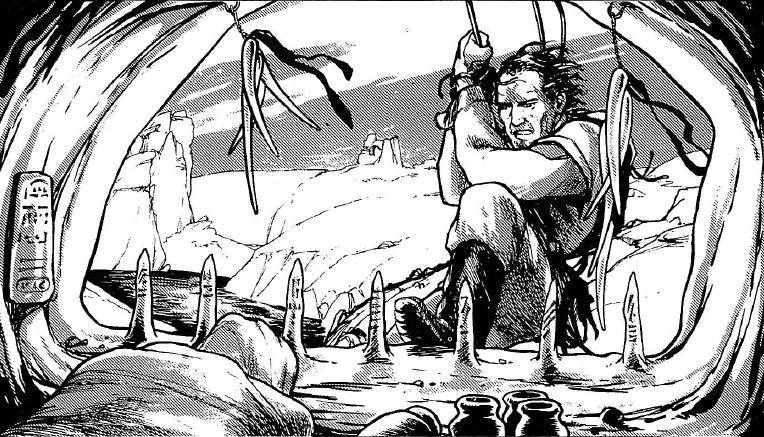The Bureau of Scouting and Exploration Services, more commonly called the New Republic Scout Service—which itself was shortened to NRSS—was the official exploration arm of the New Republic. Its goals included discovery of new planets and star systems, establishing relations with new species, and blazing new hyperspace routes. Created despite initial opposition from the New Republic Provisional Council, the NRSS eventually flourished into a galaxy-spanning organization with thousands of bases, depended upon by NRSS-employed scouts, corporate scouts, and independents.
Members of the New Republic Scout Service had a diverse array of backgrounds, from youngsters for whom it would be their first job, war-weary Rebel pilots and soldiers looking to augment their already formidable skills, and former Imperial Survey Corps scouts, many of whom had become disillusioned with the Empire and became independent scouts prior to Emperor Palpatine's death.

A New Republic Scout Service astrogator plotting a course by hand
During the early years of the New Republic, Mon Mothma proposed the Bureau of Scouting and Exploration Services, also known as the New Republic Scout Service or NRSS, to take over the duties of the previous galactic exploration organization, the Imperial Survey Corps. Though the New Republic Provisional Council opposed the creation of the Scout Service, feeling the new government's resources would be better used to assist already settled systems, Mon Mothma stressed the need to reestablish contact with lost colonies, or possibly contact new allies, in Wild Space and the Unknown Regions. The NRSS drew upon the traditions and regulations of the Galactic Republic's scout service when establishing its practices, but the depredations of the Imperial Survey Corps were long remembered, both by species it had victimized and the scouts who had lived through it, and the NRSS faced an uphill battle in cultivating a positive reputation.
During the reign of the Empire and the subsequent Galactic Civil War, certain planets were cut off from the galactic community. The primary mission of New Republic scouts was to reestablish contact with these "lost" worlds. Occasionally, New Republic scouts would discover worlds that remained enslaved by the Empire. In that event, NRSS would relay all relevant data to the New Republic Defense Force so the planet could be liberated. New Republic scouts were also expected to act as surveyors, analyzing and noting which worlds might be valuable for their resources or might be suitable for colonization. The NRSS also put a high priority on the discovery of new sentient species and previously unknown settlements. If newly discovered, or rediscovered, planets already supported a civilization, the NRSS expected its scouts to act as informal ambassadors, conveying the advantages of becoming a New Republic member world. If the inhabitants were willing to uphold the New Republic's laws, formal ambassadors would be sent to finalize the membership process.
New systems discovered by New Republic scouts had to be fully surveyed and all pertinent data recorded for the Republic's databanks. Additionally, the NRSS was responsible for ensuring that complete hyperspace calculations were made, so that diplomats, merchants, and others could make their way to the system. New Republic scouts tended to be skilled astrogators, since their duties often took them beyond established hyperlanes—sometimes deep into Wild Space.

New Republic scouts attempting to communicate with an unknown alien species
The Arpor-Lan Deeve was one of the Alliance's most renowned scouts and became a member of the influential Task Force on Alliance Security. Deeve helped establish the Rebel safeworld New Alderaan. Captain Korren Starchaser, a scout for the New Republic since its inception, was the first to chart the Serias system and recovered artifacts from The Gulch. Among his other discoveries were the Kriekaal system and its native species, the Krieks. Other notable members included Glaennor and Jarsa.
The New Republic Scout Service's highest-ranking bureaucrat was the Under Secretary of Scout Services, who answered to the New Republic's Minister of State. The NRSS comprised four departments—supply, information, military, and personnel—and the Colony Authority, a sister bureau with which NRSS worked closely.
The NRSS Department of Supply provided droids, starships, weapons, survival equipment, and other gear to assist scouts. Supply could normally be counted on only to provide "standard" equipment as needed and only after putting a requisition through several slow layers of bureaucracy; the New Republic's struggling economy prohibited the Department of Supply from acquiring large stockpiles of equipment or supplying scouts' needs in a hurry.
Scouts—whether New Republic, corporate, or independent—were required to submit claims on newly discovered planets or systems. The NRSS Department of Information registered these claims and stored them in its Library of Systems. Data on newly registered worlds was made publicly available unless a Request For Privacy was registered by the claimant, usually in cases where a military research base or similarly sensitive facility was to be built on the planet.

Scouts had to be prepared to face all types of adversity.
The military arm of the Scout Service, intended for small-scale engagements, consisted of over five thousand of the most cutting-edge military ships available to the New Republic and about fifty thousand soldiers who received training from the New Republic Defense Force. A typical mission for these soldiers was defensive in nature—securing specific areas on remote planets, serving as security aboard space stations, or guarding couriers and scout ships. Deployment of the department's forces could take months, since NRSS could not send troops to a world without consent from the Minister of State. Though officially part of NRSS, "Scout Soldiers" could be called into duty by the regular military if a crisis arose, and developed a reputation as elite warriors, partly because they tended to see more action than their regular military counterparts.
Being paired with scouts for extended periods of time typically resulted in scouts and soldiers sharing knowledge and work. Soldiers in the NRSS' military division often evolved into scouts themselves.
Personnel maintained records on active and inactive New Republic Scouts and chose missions for active scouts. Personnel also handled payroll and miscellaneous data. The department had a reputation as a "classic bureaucracy" that could be obstinate and difficult to work with.
NRSS scouts were paid five hundred credits per month; that did not include bonuses for discovering habitable worlds or new species willing to join the New Republic. These bonuses, paid by the Colony Authority, started at one thousand credits and could get as high as 0.005% of the planet's net worth—but the largest bonuses were almost never paid out in full by the cash-strapped New Republic, and were instead doled out as monthly installments of one thousand credits.
Some new recruits to the NRSS had come from the Imperial Survey Corps, which had tarnished the reputation of scouting galaxy-wide by adhering to Emperor Palpatine's goals of exploring more for conquest and exploitation than discovery. These former Imperial scouts looked to NRSS service as a means of cleansing their consciences. Likewise, veteran Rebel pilots and soldiers who had witnessed too many battlefields were drawn to the more peaceful, less regimented lifestyle of a scout. Many trainees also came into the Service without any prior experience, looking to build skill sets that would serve them well in various endeavors thereafter.

The scout life was both physically and intellectually demanding.
NRSS training lasted for nine months. During that time, recruits learned new skills like communication, first contact, geology, astrogation, and piloting. Most graduates of the training program were sent to a scout base, where they undertook an apprenticeship. Exceptional trainees, however, would be assigned to a six-being training vessel as a junior mate. The vessel would then embark on a six-month training cruise, during which the four trainees would essentially be charged with all the responsibilities of normal scout life, with their two more seasoned crewmates guiding them. Unbeknownst to the trainees, and many others in the NRSS, the various encounters and crisis experiences during the training cruise were a carefully constructed sham involving NRSS personnel posing as aliens and hostiles; the trainee's crewmates even sabotaged the ship as the final test. Following the cruise, trainees were evaluated and, depending on their performance, made full scouts or sent for further training. New scouts were also given a Spaceguide and, as of the year 7 ABY, a Scout's Survival Pack to help them.
Part of the purpose of New Republic Scout Service training was to recruit only the curious and adventurous, culling the greed-motivated applicants. Few such individuals made it into the NRSS, but due to the Service's wide reach, NRSS-affiliated scouts had to expect run-ins with mercenary scouts, claim-jumpers, and others interested only in plunder.
The NRSS' headquarters were split into two locations. The political and administrative center of the Service was the Core Post on the galactic capital planet Coruscant, near New Republic City's spaceport. It employed roughly two thousand people and housed the Nova Core, an organization for outstanding scouts. The second headquarters, in charge of NRSS' normal operations, was Ops Post on Xoemefel. Covering an area of twenty square kilometers, the Ops Post was the largest scout base of its era.
In addition to its headquarters, the New Republic Scout Service had frontier posts established on almost five thousand worlds, though many were tiny and mostly automated. These frontier posts attracted disreputable scouts and merchants, but were a necessary evil for most scouts—the most up-to-date information was to be found at these widely scattered outposts. Frontier bases also had a reputation for hosting some of the most sophisticated entertainment in the galaxy, to help combat the space madness and simple boredom that afflicted so many scouts. The NRSS sponsored live entertainment tours as a throwback to customs of old.
The New Republic Scout Service is the primary focus of Galaxy Guide 8: Scouts, the first Star Wars roleplaying book set during the New Republic era.
- Galaxy Guide 8: Scouts
- The Last Command Sourcebook
- "Scouts' Dispatch" — Star Wars Adventure Journal 13
- "Scouts' Dispatch" — Star Wars Adventure Journal 8
- The Thrawn Trilogy Sourcebook
- Gundark's Fantastic Technology: Personal Gear